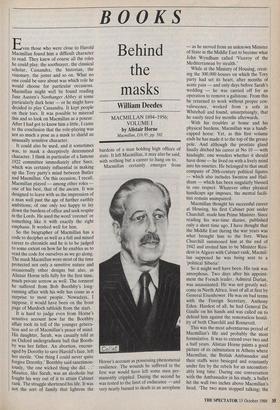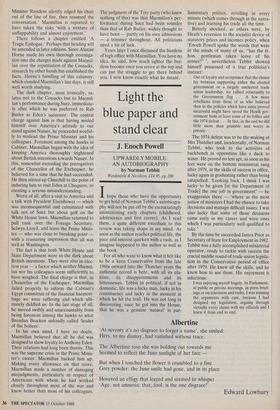BOOKS
Behind the masks
William. Deedes
MACMILLAN 1894-1956: VOLUME I by Alistair Horne Macmillan, .06.95, pp. 502 yen those who were close to Harold Macmillan found him a difficult character to read. They knew of course all the roles he could play: the soothsayer, the classical scholar, Cassandra, the historian, the visionary, the jester and so on. What no one could be sure about was which role he would choose for particular occasions. Macmillan might well be found reading Jane Austen's Northanger Abbey at some particularly dark hour — or he might have decided to play Cassandra. It kept people on their toes. It was possible to misread this and so look on Macmillan as a poseur. After I had got to know him a little, I came to the conclusion that the role-playing was not so much a pose as a mask to shield an unusually sensitive character.
It could also be used, and it sometimes was, to mask a deceptively determined character. I think in particular of a famous 1922 committee immediately after Suez, which was certainly influential in making up the Tory party's mind between Butler and Macmillan. On this occasion, I recall, Macmillan played — among other roles — one of his best, that of the ancien. It was designed to leave with us the impression of a man well past the age of further earthly ambitions; of one only too happy to lay down the burdens of office and seek respite in the Lords. He used the word 'coronet' or something like it with exactly the right emphasis. It worked well for him.
So the biographer of Macmillan has a code to decipher as well as a full and mixed career to chronicle and he is to be judged to some extent on how far he enables us to read the code for ourselves as we go along. The mask Macmillan wore most of the time protected not only a sensitive nature and occasionally other designs but also, as Alistair Home tells fully for the first time, much private sorrow as well. The torment he suffered from Bob Boothby's long- running affair with his wife has come as a surprise to most people. Nowadays, I suppose, it would have been on the front page of Murdoch tabloids from the start.
It is hard to judge even from Horne's sensitive account how far the Boothby affair took its toll of the younger genera- tion and so of Macmillan's peace of mind. His daughter, Sarah, was casually told at an Oxford undergraduate ball that Booth- by was her father. An abortion, encour- aged by Dorothy to save Harold's face, left her sterile. 'One thing I could never quite forgive Dorothy,' Boothby said sanctimon- iously, 'the one wicked thing she did. . Maurice, like Sarah, was an alcoholic but fought his way out of it to attain Cabinet rank. The struggle shortened his life. It was not the sort of family that lightens the burdens of a man holding high offices of state. It left Macmillan, it may also be said, with nothing but a career to hang on to. Macmillan certainly emerges from Horne's account as possessing phenomenal resilience. The wounds he suffered in the first war would have left some men per- manently crippled. During the second he was tested to the limit of endurance — and very nearly burned to death in an aeroplane — as he moved from an unknown Minister of State in the Middle East to become what John Wyndham called 'Viceroy of the Mediterranean by stealth.'
While at the Ministry of Housing, creat- ing the 300,000 houses on which the Tory party had set its heart, after months of acute pain — and only days before Sarah's wedding — he was carried off for an operation to remove a gallstone. From this he returned to work without proper con- valescence, worked from a sofa in Whitehall and found, unsurprisingly, that he easily tired for months afterwards.
With his troubles at home and his physical burdens, Macmillan was a handi- capped horse. Yet, as this first volume ends he has made it to the top of the greasy pole. And although the prostate gland finally ditched his career at No 10 — with hindsight, one wonders whether it should have done — he lived on with a lively mind into his nineties. He belonged to that small company of 20th-century political figures — which also includes Swinton and Hail- sham -- which has been singularly blessed in one respect. Whatever other physical handicaps age imposes, the mental facili- ties remain unimpaired.
Macmillan thought his successful career at Housing, his first Cabinet post under Churchill, made him Prime Minister. Since reading his war-time diaries, published only a short time ago, I have thought that the Middle East during the war years was what brought him to the fore. When Churchill summoned him at the end of 1942 and invited him to be Minister Resi- dent in Algiers with Cabinet rank, Macmil- lan supposed he was being sent to a `political Siberia'.
So it might well have been. His task was amorphous. Two days after his appoint- ment the French leader, Admiral Darlan, was assassinated. He was not greatly wel- come in North Africa, least of all at first by General Eisenhower. He was on bad terms with the Foreign Secretary, Anthony Eden. Hardest of all, he had General De Gaulle on his hands and was called on to defend him against the remorseless hostil- ity of both Churchill and Roosevelt.
This was the most adventurous period of Macmillan's life and probably the most formulative. It was to extend over two and a half years. Alistair Horne paints a good picture of its culmination in Athens where Macmillan, the British Ambassador and their staffs were besieged and constantly under fire by the rebels for an uncomfort- ably long time. During one conversation with the Ambassador in his study, a bullet hit the wall two inches above Macmillan's head. 'The two men stopped talking; the I Minister Resident silently edged his chair out of the line of fire, then resumed the conversation.' Macmillan is reported to have taken the risks 'with a mixture of unflappability and almost enjoyment.'
There follows a chapter entitled 'A Tragic Epilogue.' Perhaps that heading will be amended in later editions. Since Alistair Horne made his own thorough investiga- tion into the charges made against Macmil- lan over the repatriation of the Cossacks, research by other hands has established the facts. Home's handling of this calumny, which clouded Macmillan's last days, is still well worth studying.
The dark chapter, most ironically, re- lates not to the Cossacks but to Macmil- lan's performance during Suez, immediate- ly after which he was preferred to Rab Butler as Eden's successor. The central charge against him is that having misled himself over America's attitude to our stand against Nasser, he proceeded woeful- ly to mislead the Prime Minister and his colleagues. Foremost among the hawks in Cabinet, Macmillan began with the idea of keeping America thoroughly frightened about British intentions towards Nasser. In this, somewhat exceeding the prerogatives of the Chancellor of the Exchequer, he believed for a time that he had succeeded. He then stirred up Churchill to the point of inducing him to visit Eden at Chequers, so creating a serious misunderstanding.
Worst of all, after a visit to America and a talk with President Eisenhower — which was inconsequential and culminated with talk not of Suez but about golf on the White House lawn, Macmillan returned to pull rank over the Foreign Secretary, Selwyn Lloyd, and leave the Prime Minis- ter — who was close to breaking point with a reassuring impression that all was well in Washington.
The fact is that both White House and State Department were in the dark about British intentions. They were also in elec- tion year — a factor which neither Macmil- lan nor his colleagues seem sufficiently to have weighed. The final charge is that, as Chancellor of the Exchequer, Macmillan failed properly to inform the Cabinet's Egypt committee of the financial haemorr- hage we were suffering and which ulti- mately diddled us. In the last stage of all, he moved swiftly and unaccountably from being foremost among the hawks to what Brendan Bracken unkindly called 'leader of the bolters'.
In his own mind, I have no doubt, Macmillan believed that all he did was
designed to show loyalty to Anthony Eden.
Their relations had long been thorny. This was the supreme crisis in the Prime Minis- ter's career. Macmillan backed him up.
Making every allowance on that score, Macmillan made a number of damaging misjudgments, particularly in respect of Americans with whom he had worked closely throughout most of the war and knew better than most of his colleagues. The judgment of the Tory party (who knew nothing of this) was that Macmillan's per- formance during Suez had been sounder than that of Rah Butler, widely thought to have been — partly on his own admissions — a trimmer throughout. All politicians need a bit of luck.
Years later I once discussed the burdens of high office with Macmillan. You have no idea, he said, how much lighter the bur- dens become once you arrive at the top and can put the struggle to get there behind you. I now know exactly what he meant.



























































 Previous page
Previous page